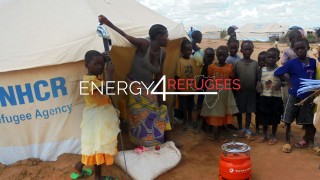Energy 4 Displaced People
There are nearly 65 million forcibly displaced people worldwide, and most of them have poor access to energy.
Within refugee camps, facilities such as schools and healthcare centres are mostly powered by inefficient diesel generators, while wood is largerly used for cooking, and kerosene or torches for lighting. Outside the camps, which is where 85% of refugees live, the extra pressure put on finite resources and infrastructure can be a serious problem for the hosting populations, who often face similar energy access challenges.
To respond to these challenges, Energy 4 Impact set up the Moving Energy Initiative – a collaboration between Energy 4 Impact, Chatham House, Practical Action Consulting, the Norwegian Refugee Council (NRC), and the Office of the United Nations High Commissioner for Refugees (UNHCR), funded by the Foreign, Commonwealth and Development Office (FCDO) – that has developed new approaches to providing energy access and management in humanitarian settings. The aim is to support the widespread adoption of new practices modelled on those used in the private sector with a particular emphasis on creating new markets and partnership opportunities for supplying renewable energy.
The findings from a series of research studies conducted over the course of the past four years form the basis for a number of interventions, testing new ways of delivering sustainable energy solutions in camps in Kenya and Burkina Faso and in non-camp setting in Jordan. These include optimising the management of energy consumption to bring reductions; addressing the funding challenges for financing new projects; creating and delivering low carbon projects; identifying and strengthening markets for renewables within refugee communities and investigating the feasibility of new public private partnerships.
Energy 4 Impact is also working with Practical Action to improve the livelihoods and energy access of thousands of refugees in the Rwandan camps of Kigeme, Nyabiheke and Gihembe through the Renewable Energy for Refugees (RE4R) project. The initiative, brought together by Energy 4 Impact, in partnership with Practical Action, UNHCR, and funded by the IKEA Foundation, targets the provision of solar-powered electricity for households, small enterprises, institutions and community facilities as well as job creation and income generation for both the displaced populations and their host communities.
Furthermore, in Uganda we have been implementing, with a partner, a USAID-funded intervention to incentivise pay as you go companies to sell solar home systems into three refugee settlements, resulting in over 20,000 people with improved energy access.

